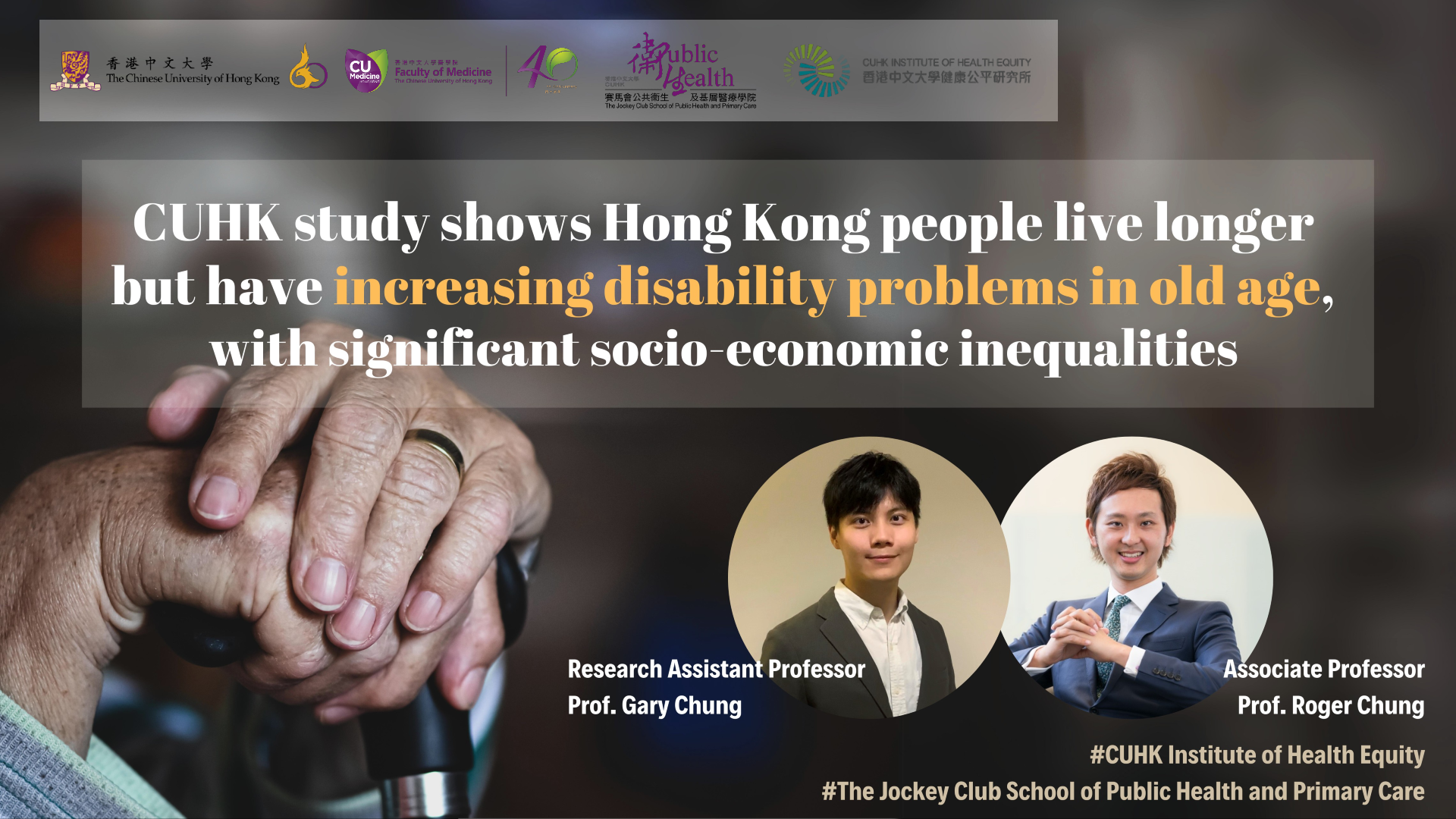
The Chinese University of Hong Kong (CUHK)’s Faculty of Medicine (CU Medicine) and the CUHK Institute of Health Equity conducted a study to assess the temporal trends and area-level socioeconomic inequalities in life expectancy (LE) and disability-free life expectancy (DFLE) at age 65 in Hong Kong between 2007 and 2020.
The results showed that the proportion of time old people living with disability has been increasing in Hong Kong. Also, apparent socioeconomic gradients of LE and DFLE were observed across 18 districts in the territory.
The findings have been published in The Lancet Regional Health – Western Pacific, an international peer-reviewed medical journal within The Lancet Group.
Professor Roger Chung Yat-nork, Associate Professor in the Jockey Club School of Public Health and Primary Care at CU Medicine, said, “Life expectancy considers only the quantity but not quality of life, and so an improved life expectancy does not necessarily reflect a better state of health. The paradigm shift towards functioning and quality of life from simply emphasising the quantity of life alone has led to the development of ‘healthy life expectancy’, broadly defined as the average number of years that a person can expect to live in full health, calculated by taking into account years lived in less than full health due to disease and/or injury. In other words, it is a single composite measure that incorporates both mortality and health status.”
Professor Gary Chung Ka-ki, Research Assistant Professor in the Jockey Club School of Public Health and Primary Care at CU Medicine, said, “This alarming result implies a substantial increase in the proportion of life spent with disability, leading to an expansion of the disability burden among the Hong Kong population. Our study strongly affirms that it is inadequate to focus on LE alone, which may be a façade that conceals the problems related to the burden of disease. DFLE is a critical indicator that should be routinely adopted in Hong Kong not only to assess and monitor the progress of improvement in population health and healthy ageing, but also to offer a more comprehensive picture of the health equity situation of society.”
The study was supported by the Health Bureau’s Health and Medical Research Fund.

Details: Faculty of Medicine, CUHK: http://bit.ly/3T0brdk
Full article of the study: https://bit.ly/3GfEAti
News coverage:
- 明報 – 中大研究:長者雖更長壽 離世前殘疾比例增
- 東網 – 香港人全球最長壽卻老年殘疾嚴重 研究:經濟地位愈高愈健康
- 香港財經時報 – 中大:港人雖長壽但老年殘疾問題嚴重!健康監測不應只計預期壽命
- 香港新聞網 – 中大研究:港人老年殘疾問題嚴重且地區經濟差異大
- 大紀元 – 中大研究:港人長壽但老年殘疾問題嚴重
- 悅傳媒 – 調查:本港長者在離世前 伴隨殘疾的時間大幅增加
- 京港學術交流中心 – 中大研究:香港人雖長壽但老年殘疾問題嚴重・存在地區間的社會經濟不平等
- 金銀島 – 中大研究:港人壽命延長,但疾病負擔增加 倡關注「無殘疾平均預期壽命」助健康老齡化
- Health Concept – 【中大研究】港人全球最長壽 殘疾長者卻大增 研究:經濟越好越健康
- South China Morning Post – Hongkongers are living longer, but extra time comes with disabilities and women suffer more than men, study finds
- The Standard – Higher economic status means better health: CUHK survey
- U Magazine – 香港人最球最長壽 但研究指老年殘疾情況嚴重 未來老人醫療及護理需求令人擔憂
